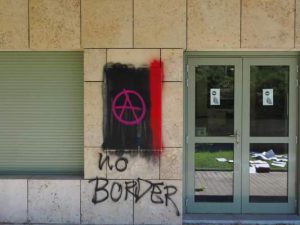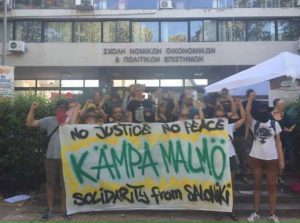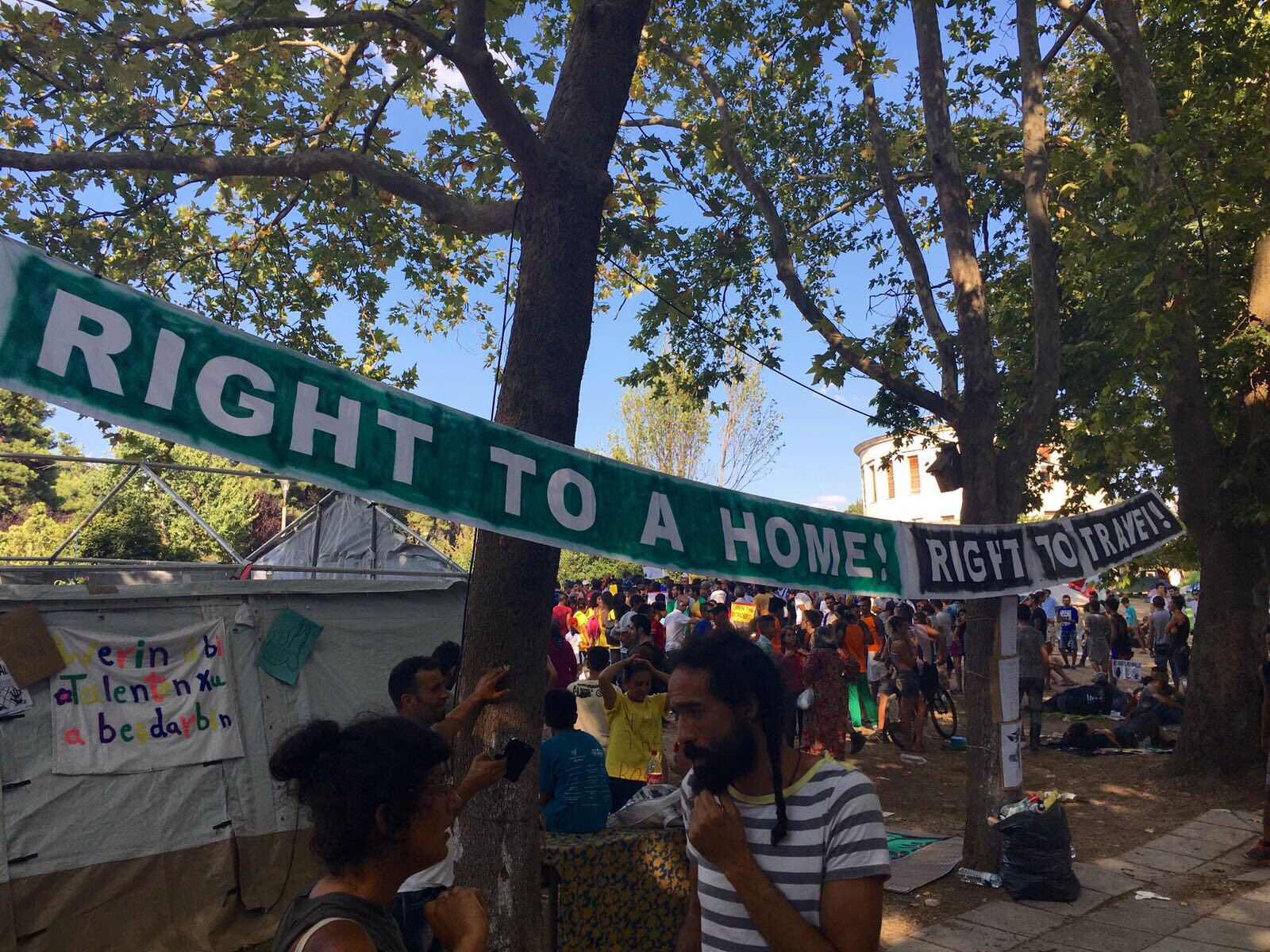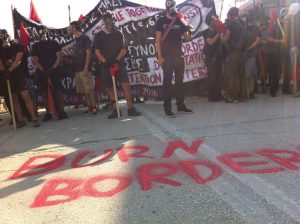This is an evaluation written by activists both inside and outside of Organizing Autonomously.
We, a small of group of activists from the Malmö-Lund area in southern Sweden went to the No Border Camp in Thessaloniki, Greece from the 15th to the 24th of July, 2016. Organized in different structures, some of us stayed for the entire duration, some shorter. These are our common reflections on the camp.
We went to Thessaloniki with different purposes but above all with the aim of connecting to activists, different political groups and movements with similar political struggles as ours. We were motivated by a desire to confront Fortress Europe and support and co-organize resistance with the refugees from North Africa and the Middle East at it’s front line, the Greek border to Turkey and the other passageways within Greece.
The idea of the No Border camp resonated well with the political situation and struggles we’ve previously had in the Swedish context. Many of us have been trying to fight the border controls at the Swedish-Danish border, the new harsher migration laws and to organize solidarity work with migrants. Of course getting away from the rainy and cold Swedish summer was a motivator as well… Above all, we’d like to thank the organizers for the initiative of the camp.
Our experiences & actions.

Arriving at the campus, we were overwhelmed by the amount of people there. More than 1500 activists from all over Europe had come. The mobilization and the establishment of physical infrastructure at first sight such as the camp kitchen, sanitary facilities and infopoints were impressive.
During the first day, different workshops regarding the connection of struggles along the Balkan route took place and some of us joined the No Border convoy to a so-called relocation center in Western Thessaloniki. There, the refugees, overwhelmingly from Syria, are forced to live under frightening conditions: overcrowded tents, insufficient provisions and unsatisfying sanitary facilities. Sadness, but also frustration and anger filled our minds that day but were, however, partly lifted by a spontaneous, refugee-led demonstration to occupy a nearby square with the demand to “Open The Borders” and “Europe, Frontex, Police: Stop Killing Refuggees!”
On the second day we joined the Beyond Europe network to occupy the Greek national TV Station ERT3 and thus force them to cover not only our political gathering in nationwide news but bring back the long invisible topic of refugee mistreatment by the Greek state to the forefront.
We also participated in smaller actions such as a successful demonstration complete with spray cans and paint bombs at the doors of one of the desk-based culprits of Fortress Europe, the International Organizations of Migration which states to “manage migration” and push for the implementations of so called “voluntary returns”, in other words deportations mostly to unsafe countries of origin.
In the following days, both the German and the French embassy were granted a visit. We took part in this action in order to highlight the hypocrisy of the German government that presents itself as the most generous receiver of migrants while in fact as Europe’s hegemonic power it is highly responsibly not only for the mass murder of refugees in the Mediterranean sea, the compromise with Erdogan’s inhumane ‘refugee deal’ and lastly, of course the well-known harsh austerity measures in the European peripheries. With the visit to the French embassy where we expressed our solidarity to the striking workers and students, we aimed to bring our point across that struggles against capitalism and a European-wide racist and nationalist consensus must go hand in hand.
On July, 20th there was a powerful protest of around 1000 activists at detention camps in the outskirts of Paranesthi and Xanthi which are in reality nothing less than actual refugee prisons. On Thursday an even more impressive demonstration took place, the “Migrants Pride” with around 2500 persons altogether, constituting the biggest action of the camp. The same night however, there was a big conflict within the camp concerning possible militant actions. We will not get into detail here but we are very skeptical towards using the big stage of the camp to attack other comrades and to impose ones will upon others. These actions had large negative impacts on the camp. Lastly, on Saturday about 300 people went by bus to the Greek/Turkish border where there was a brief clash with police.

We also sent a solidarity message to our comrades in Sweden after the ridiculously low sentences against fascists who had stabbed them.There were many other actions as well, such as against city hall, against the Turkish embassy and the fascist developments in Turkey after the coup d’etat attempt. The amount of different activities for different levels of militancy and interests was very positive. It is always important to be able to be inclusive and broad in our political activities.
A few negative things.
Not everything we experienced in the camp itself was uplifting however, especially women* and trans people often felt unsafe as targets of male sexualized aggression. It was good that these incidents were taken seriously, even more so after a powerful spontaneous demonstration on the campus that made it clear that sexist and transphobic aggressors were absolutely not welcome!
There was a lack of organization and responsibility holders which slowly improved with the continuation of the camp. However, this led to burn out and to the weakening of the political work such as when migrants were basically dumped into the camp and left to themselves without any direction, explanation or purpose. If there was a longer term cooperation and sustainable organization with migrants from below it was at least at times very difficult to spot.

In the end we want to build a new world, to do away with structures of power and oppression, but if we can’t even manage to organize a camp not just safely but also efficiently then how can we expect people to be convinced by our politics? While it’s fine for us to spend a week somewhere and then go back to our own lives of (relative) comfort these things are important as symbols of what we can and can’t do when we create a new world and a new life: who wants to live in a space where we can’t handle transphobia, drug dealing, theft and childcare? Further, while some activists can spend six hours a day on an assembly it is just not feasible for most other people. It is not authoritarian to have structured meetings, rather the opposite. It’s impossible to actually organize democracy without some rules to facilitate that everyone is heard and that time is not wasted.
We left the camp with mixed feelings. On the on hand we didn’t manage to do any major actions against Fortress Europe beyond symbolic actions, this was much in part due to infighting over the lack of consensus for more militant actions. While we can always discuss tactics we know the big action against the border regime fell through due to these events and the camp itself did not manage to send any bigger signals of solidarity and struggle. On the one hand we gained a lot of new strength and motivation through meeting both old and new comrades. We saw first hand the utter misery of refugees in the European peripheries that left us with feelings of sadness and frustration but also the insights of a heightened necessity of resistance and struggle against Fortress Europe. Finally, we gained a practical understanding of how important the extra-parliamentary left is especially in these days after the SYRIZA government has shown that they are once more betraying the most vulnerable by evicting three squats for migrants only two days after the camp.
Therefore, the struggle continues against Fortress Europe, racism and nationalism continues!
